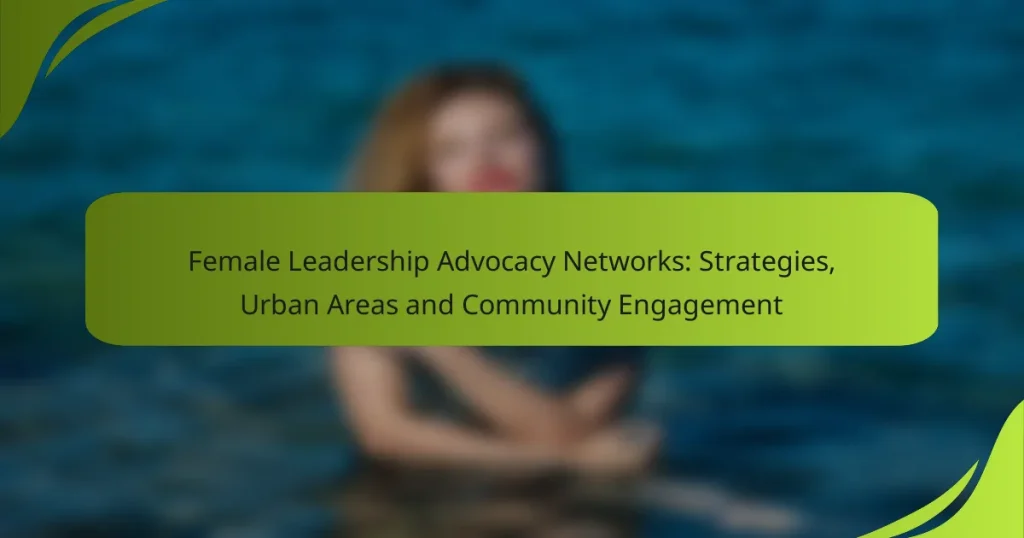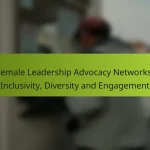Female leadership advocacy networks play a crucial role in empowering women in urban areas through targeted strategies such as mentorship programs, networking events, and community partnerships. By fostering engagement and collaboration, these networks create supportive environments that enhance leadership skills and encourage active participation in local initiatives. Their commitment to diversity and resource accessibility further strengthens the impact of women leaders within their communities.

What strategies enhance female leadership advocacy in urban areas?
Effective strategies for enhancing female leadership advocacy in urban areas include mentorship programs, networking events, workshops, community partnerships, and online platforms. These approaches create supportive environments that empower women and foster leadership skills.
Mentorship programs
Mentorship programs connect aspiring female leaders with experienced professionals who can provide guidance and support. These relationships often focus on career development, skill enhancement, and navigating workplace challenges. Successful programs typically include structured meetings, goal-setting, and regular feedback.
For instance, a city-based mentorship initiative might pair young women with female executives in local businesses, facilitating knowledge transfer and networking opportunities. It’s crucial to ensure that mentors are trained to provide constructive feedback and support.
Networking events
Networking events are vital for building connections among women in leadership roles. These gatherings can range from informal meetups to formal conferences, allowing participants to share experiences and resources. Effective networking events often include panel discussions, breakout sessions, and opportunities for one-on-one interactions.
To maximize impact, consider hosting events in accessible urban venues and promoting them through local community organizations. Providing a mix of structured activities and free networking time can help attendees forge meaningful connections.
Workshops and training
Workshops and training sessions equip women with essential skills for leadership roles. These programs can cover topics such as public speaking, negotiation, and conflict resolution, tailored to the specific needs of participants. Interactive formats, such as role-playing and group discussions, enhance learning and retention.
Offering workshops in collaboration with local universities or professional organizations can attract a diverse audience. Consider providing scholarships or sliding scale fees to ensure accessibility for all women in the community.
Community partnerships
Community partnerships leverage local resources and expertise to support female leadership initiatives. Collaborating with schools, non-profits, and businesses can amplify the reach and effectiveness of advocacy efforts. These partnerships can facilitate joint events, resource sharing, and mentorship opportunities.
For example, a partnership between a local university and a women’s organization could create internship programs that place female students in leadership roles within community projects. Establishing clear goals and mutual benefits is key to successful partnerships.
Online platforms
Online platforms provide a space for women to connect, share resources, and access leadership training remotely. These platforms can include social media groups, dedicated websites, or forums that focus on female leadership. They allow for flexibility and can reach a wider audience beyond geographical limitations.
To enhance engagement, consider creating a dedicated online community where members can participate in discussions, share success stories, and access exclusive content. Regularly updating the platform with relevant resources and events can keep members active and involved.
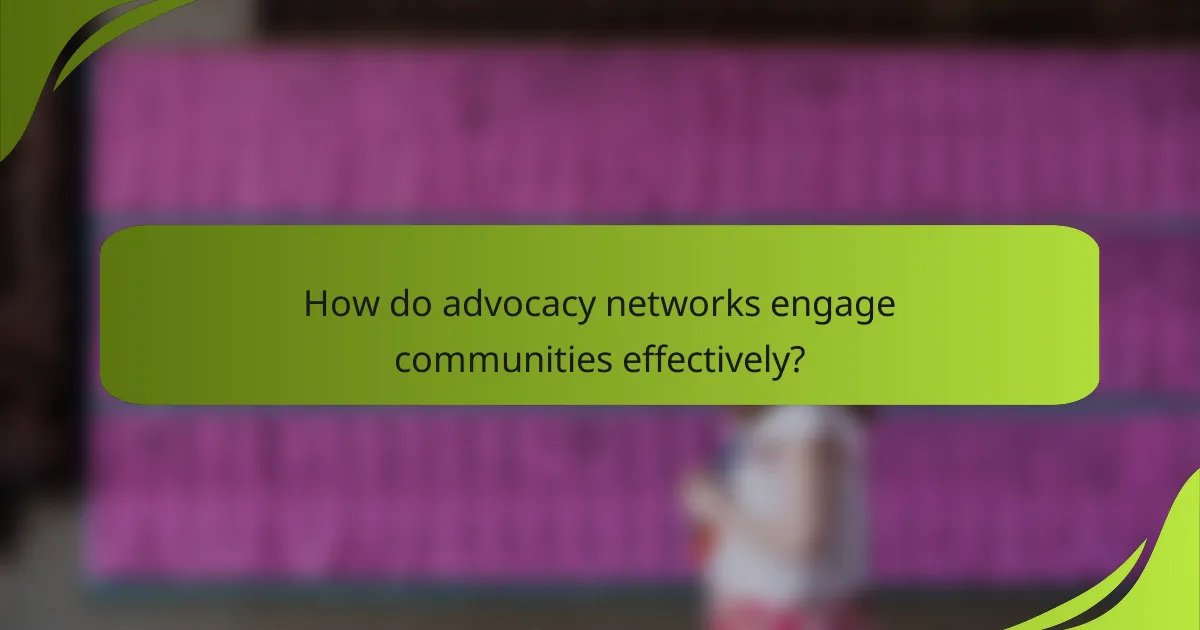
How do advocacy networks engage communities effectively?
Advocacy networks engage communities effectively by fostering participation through targeted outreach, utilizing digital platforms, and collaborating on projects that resonate with local needs. These strategies create a sense of belonging and empower individuals to become active participants in leadership initiatives.
Local outreach initiatives
Local outreach initiatives are crucial for building trust and rapport within communities. These can include workshops, town hall meetings, and informational sessions that address specific issues faced by women in leadership roles. Engaging local leaders and influencers can enhance credibility and encourage broader participation.
For example, organizing a series of community forums in urban areas can help identify unique challenges and opportunities, allowing advocacy networks to tailor their approaches effectively. Providing resources such as mentorship programs or skill-building workshops can further support community engagement.
Social media campaigns
Social media campaigns are a powerful tool for advocacy networks to reach a wider audience and engage communities. Platforms like Facebook, Twitter, and Instagram allow for real-time interaction and sharing of success stories, which can inspire others to get involved. Creating shareable content that highlights local female leaders can amplify visibility and support.
To maximize impact, campaigns should focus on specific themes or events, such as International Women’s Day, and encourage community members to participate by sharing their experiences. Utilizing hashtags and interactive content, such as polls or challenges, can also foster engagement and drive conversations around female leadership.
Collaborative projects
Collaborative projects bring together various stakeholders, including local businesses, schools, and non-profits, to address common goals related to female leadership. These partnerships can lead to innovative solutions and shared resources, making initiatives more sustainable and impactful. For instance, a joint project between a local university and an advocacy network could create internship opportunities for young women.
When planning collaborative projects, it is essential to establish clear objectives and roles for each partner to ensure alignment. Regular communication and feedback loops can help maintain momentum and adapt strategies as needed, ultimately strengthening community ties and enhancing the effectiveness of advocacy efforts.

What are the key attributes of successful female leadership networks?
Successful female leadership networks are characterized by their commitment to diversity, access to essential resources, and strong leadership. These attributes foster an environment where women can thrive, collaborate, and drive change within their communities.
Diversity and inclusion
Diversity and inclusion are fundamental to the effectiveness of female leadership networks. A diverse network brings together individuals from various backgrounds, experiences, and perspectives, enhancing creativity and problem-solving. Inclusion ensures that all voices are heard and valued, which can lead to more innovative solutions and stronger community ties.
To promote diversity, networks should actively seek members from different ethnicities, socioeconomic statuses, and professional fields. This can be achieved through outreach programs and partnerships with organizations that serve underrepresented groups.
Access to resources
Access to resources is crucial for the success of female leadership networks. This includes financial support, educational opportunities, mentorship programs, and networking events. By providing these resources, networks empower women to develop their skills, expand their professional connections, and gain confidence in their leadership abilities.
Networks can facilitate access to resources by collaborating with local businesses, educational institutions, and government agencies. For example, offering workshops or training sessions can help members acquire new skills while fostering a sense of community.
Strong leadership
Strong leadership within female leadership networks is essential for guiding and inspiring members. Effective leaders set clear goals, create a vision for the network, and foster an inclusive environment where all members feel empowered to contribute. They also play a key role in advocating for the network and its members in the broader community.
To cultivate strong leadership, networks should invest in leadership development programs and encourage experienced members to mentor emerging leaders. This approach not only strengthens the network but also ensures a sustainable pipeline of future leaders who can continue to advocate for women’s empowerment.
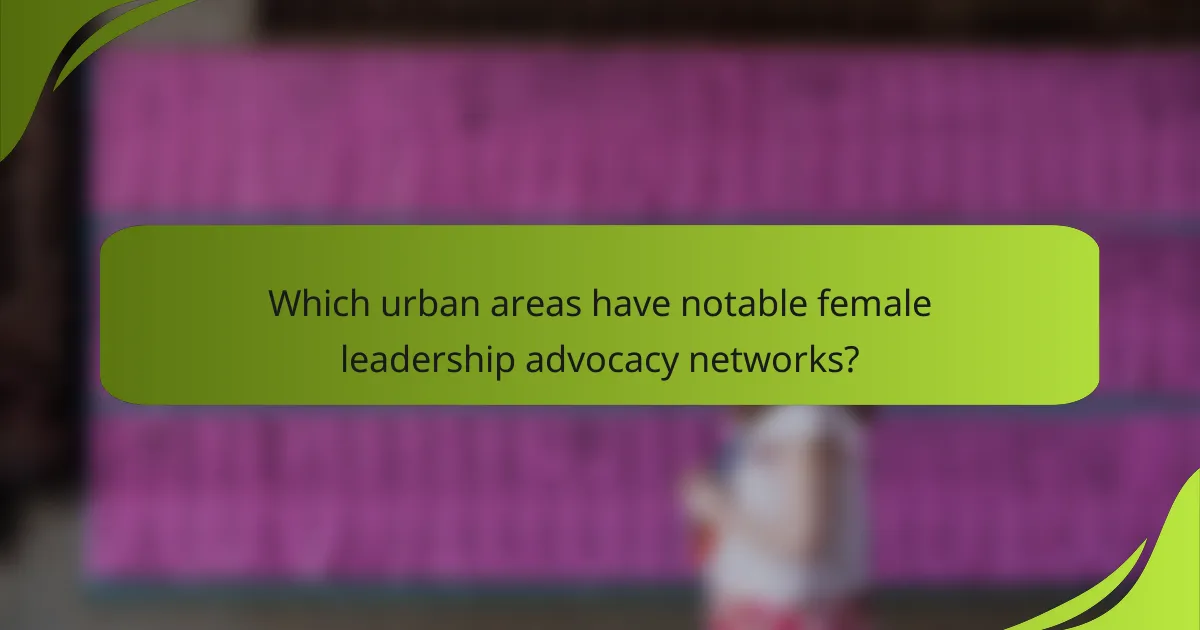
Which urban areas have notable female leadership advocacy networks?
Several urban areas are recognized for their strong female leadership advocacy networks, which support women in leadership roles through mentorship, resources, and community engagement. Notable cities include New York City, San Francisco, Chicago, and Los Angeles, each with unique initiatives and organizations dedicated to empowering women leaders.
New York City
New York City boasts a vibrant ecosystem for female leadership advocacy, with organizations like the Women’s Leadership Network and the New York Women’s Foundation. These groups provide mentorship programs, networking events, and funding opportunities aimed at elevating women in various sectors.
Additionally, NYC hosts numerous workshops and conferences that focus on leadership skills, negotiation tactics, and career advancement strategies tailored for women. Engaging with these resources can significantly enhance visibility and opportunities for aspiring female leaders.
San Francisco
San Francisco is home to a dynamic community of female leadership advocacy networks, particularly in the tech industry. Organizations such as Women Who Code and Girls in Tech focus on empowering women through education, mentorship, and professional development in technology and entrepreneurship.
The city also offers various events, including hackathons and speaker series, that encourage collaboration and innovation among women leaders. Participation in these initiatives can help build essential skills and foster valuable connections within the tech community.
Chicago
Chicago’s female leadership advocacy networks are characterized by a strong emphasis on community involvement and social impact. Organizations like the Chicago Foundation for Women and the Women’s Business Development Center provide resources and support for women entrepreneurs and leaders across various sectors.
These networks often host events that focus on leadership training, funding opportunities, and advocacy for women’s rights. Engaging with these organizations can help women navigate challenges in leadership roles while fostering a supportive community.
Los Angeles
Los Angeles features a diverse array of female leadership advocacy networks that cater to various industries, including entertainment, business, and non-profit sectors. Groups such as the Los Angeles Women’s Network and Women in Film offer mentorship, networking, and educational programs designed to empower women leaders.
LA also hosts numerous events, including film screenings and panel discussions, that highlight the achievements of women in leadership. Involvement in these initiatives can provide inspiration and practical insights for women looking to advance their careers in competitive fields.
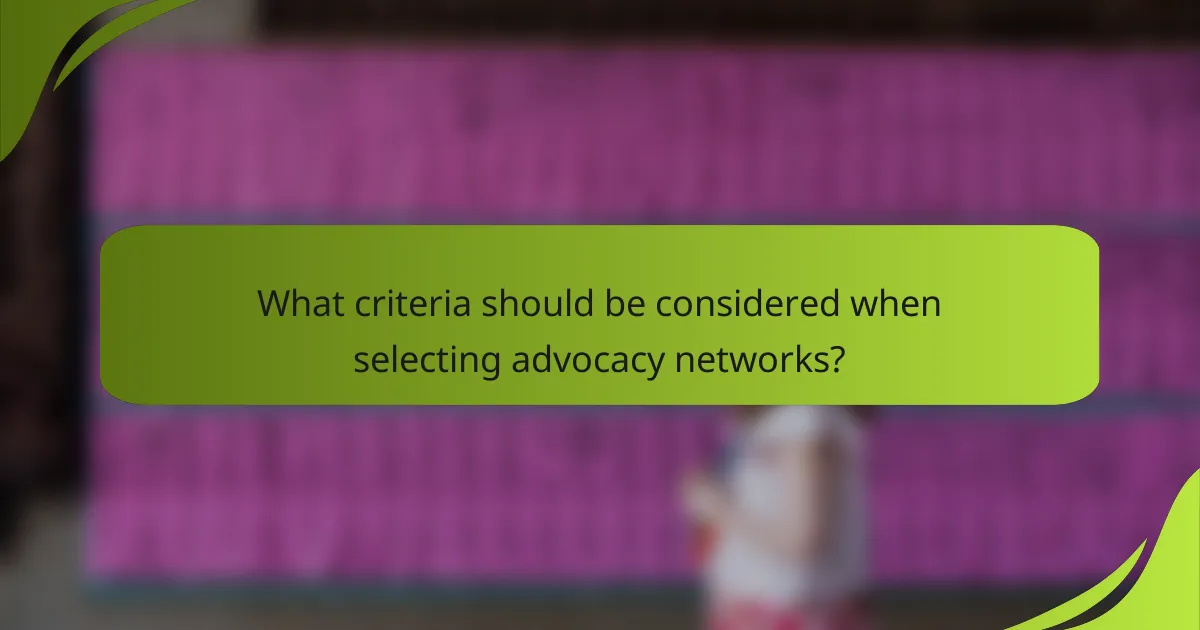
What criteria should be considered when selecting advocacy networks?
When selecting advocacy networks, it’s essential to consider factors such as mission alignment, community engagement, and the network’s track record. These criteria help ensure that the network effectively supports female leadership and resonates with the specific needs of the urban areas involved.
Mission alignment
Mission alignment refers to how closely the goals of the advocacy network match the objectives of your organization or initiative. A strong alignment ensures that both parties work towards the same outcomes, maximizing impact and resource efficiency.
To assess mission alignment, review the network’s stated goals, values, and past initiatives. Look for networks that have demonstrated success in promoting female leadership in urban settings similar to yours. This can include initiatives focused on mentorship, policy advocacy, or community development.
Consider creating a checklist of key mission elements that are important to your organization. For example, prioritize networks that emphasize inclusivity, empowerment, and measurable outcomes in their advocacy efforts. This will help streamline your selection process and identify the most suitable partners.
